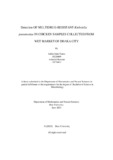Detection of multidrug-resistant Klebsiella pneumoniae in chicken samples collected from wet markets of Dhaka City
Abstract
In both humans and animals, antibiotics are often used as a kind of treatment and to prevent illness. Antibiotic resistance may, however, also increase due to broad antibiotic usage. This study aimed to investigate the number of multidrug-resistant (MDR) Klebsiella pneumoniae in chicken samples in Dhaka. Chicken cloacal swabs and chicken breast flesh were randomly selected from seven chickens. The obtained cloacal swab and meat samples were inoculated on a HiCrome KPC agar medium for isolation and identification. After the first positive cultures, single colonies were extracted and recognized by their color. Of all the samples, 14 (100%) tested positive for K. pneumoniae. The antimicrobial confirmation test found that every 112 isolates of K. pneumoniae were an MDR (multi-drug-resistant) bacterium. Amoxicillin (92.6%), cefixime (67.2%), ciprofloxacin (64.9%), tetracycline (100%), and erythromycin (58.25%) are all resistant in antibiotic sensitivity testing. Gentamicin (90%), Meropenem (96%), Piperacillin, and tazobactam (88.5%) antibiotic sensitivity testing observed that K. pneumoniae was sensitive to all 112 chicken isolates examined. The proportion of resistant K. pneumoniae isolates from 7 chicken antibacterial agents has been confirmed by this investigation. Multidrug-resistant bacteria pose a risk to both human and animal health. Due to Bangladeshi chicken producers continued use of antibiotics without a veterinarian's oversight, there are few effective treatments for the effects of these illnesses.

